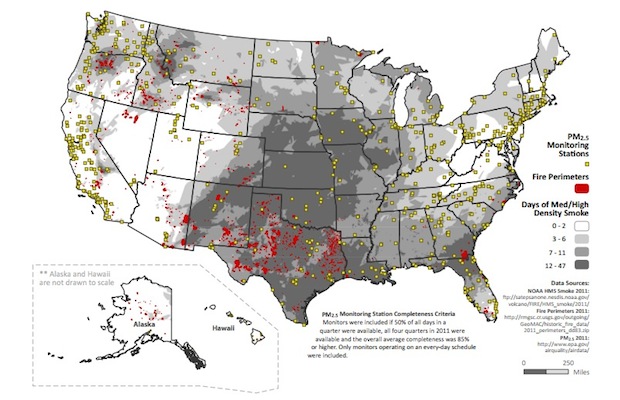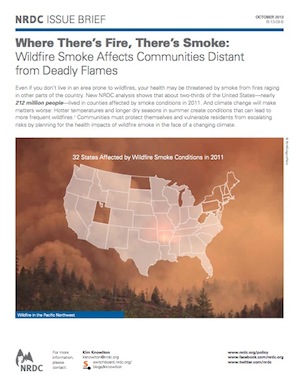
More than 3.7 million people in Oklahoma — almost the entire state population — were exposed to a week or more of wildfire smoke in 2011, according a report by the National Resource Defense Council.
National Resource Defense Council


More than 3.7 million people in Oklahoma — almost the entire state population — were exposed to a week or more of wildfire smoke in 2011, according a report by the National Resource Defense Council.
National Resource Defense Council

National Resource Defense Council
More than 3.7 million people in Oklahoma — almost the entire state population — were exposed to a week or more of wildfire smoke in 2011, according a report by the National Resource Defense Council.
Wildfires are a well-known hazard in Oklahoma. In 2012 alone, summer fire storms destroyed more than 600 homes and 114,000 acres across the state.
The danger posed by localized fires is easy to understand, but Oklahomans are also exposed to smoke from wildfires in other states, a report by a national environmental group shows.
Oklahoma was the No. 9 most “smoke-affected” state in 2011, according to the study by the National Resource Defense Council, an environmental group. Despite having comparatively few fires in 2011, Oklahoma was downwind of almost all the states ravaged by fire that year.
| RANK | STATE | POP. IN WILDFIRE AREAS | POP. EXPOSED TO WEEK OR MORE OF SMOKE |
|---|---|---|---|
| 1 | Texas | 422,149 | 25,137,743 |
| 2 | Illinois | 0 | 11,954,199 |
| 3 | Florida | 55,374 | 11,247,799 |
| 4 | Missouri | 0 | 5,988,927 |
| 5 | Georgia | 100,920 | 5,704,123 |
| 6 | Louisiana | 3,259 | 4,533,372 |
| 7 | Michigan | 217 | 3,932,436 |
| 8 | Alabama | 179 | 3,929,239 |
| 9 | Oklahoma | 3,765 | 3,751,351 |
| 10 | Iowa | 0 | 3,010,969 |
Source: National Resource Defense Council, “Where There’s Fire, There’s Smoke”

National Resource Defense Council
Click here to read a .pdf of the NRDC's report on wildfire smoke exposure.
More than 3.7 million people — almost the entire state population — were exposed smoke conditions for one week or more in 2011, NRDC’s study shows. Most of Oklahoma’s exposed population experienced the “high range” of 12 to 47 days of smoke conditions, according to the study.
The numbers are striking when you compare them to the number of people in Oklahoma who actually lived in areas with wildfires that year: 3,765, according to the NRDC.
Wildfire smoke contains tiny particles that can cause health problems. The impact ranges from minor nuisances, like itchy eyes and sore throat, to triggering serious problems, like asthma and pneumonia. Wildfire smoke can also worse can worsen chronic heart and lung diseases.
Oklahoma has entered its third year of drought, and dry conditions have fueled wildfires here and around the country.
“The clear takeaway is that wildfires, smoke, and the conditions that increase fire risk are national health concerns that spread well beyond the borders of local fire perimeters,” the report’s author’s wrote —
Those ideal wildfire conditions are likely to worsen because of the effects of climate change, the NRDC writes. The environmental group also advocates for more air pollution monitoring stations — the yellow dots on the above map. Oklahoma has nine, according to the NRDC report.